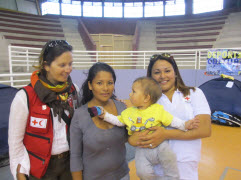
Following the 8.2 magnitude earthquake in Chile on April 1, 2014, the International Federation of Red Cross and Red Crescent Societies mobilized its Regional Response Unit (RRU) for the first time. Bringing together expertise from Red Cross National Societies, including the Canadian Red Cross, the unit provided support for the emotional and psychological needs of those affected and helps build the capacity of Chilean Red Cross volunteers so they can continue to provide psychosocial support to communities in the future.
Psychosocial support is essential during and after a crisis, and can make a significant difference for a person who has experienced a traumatic event. With support from the Government of Canada, the Canadian Red Cross deployed two aid workers, a team leader and an expert in psychosocial support, to join the five person team made up of personnel from Colombia and Jamaica. In addition, the Canadian Red Cross sent psychosocial support equipment, including training manuals, games and teaching resources, from Canada to assist with the community interventions.
This equipment was used by many, including Joseline Soto and her two children who were displaced from their home after the earthquake. They are now living in a shelter set up in a stadium in La Pampa, where the Red Cross is providing support to families.
“No organizations have come to provide help but this is the second time the Red Cross has come,” said Joseline, who is smiling as she watches her young daughter Antolela play the games and dance to the music with the Red Cross volunteers.
Sophie Briand, Canadian Red Cross RRU team leader, said emotional scars can last a lifetime. "The material part – houses, goods and personal things – are recoverable, while the loss of a loved one or the experience of danger can cause long-lasting trauma.”
The Regional Response Unit brings value to all Red Cross partners involved in a response by strengthening the cooperation and mutual support between National Societies, reducing costs of transportation and taking advantage of the regional resources available. In addition, it takes advantage of the regional resources available enabling the Red Cross to coordinate more agile and effective responses in times of emergency or disaster.